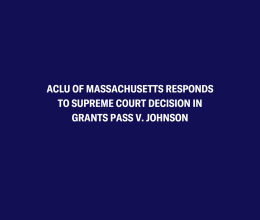
On Tuesday, April 5 at a hearing beginning at 9am before the Massachusetts Supreme Judicial Court, the American Civil Liberties Union of Massachusetts, retired federal judge Nancy Gertner, and dozens of legal, community and religious organizations will ask the state's high court to rule that "mandatory" minimum sentencing in Massachusetts is not, in fact, strictly mandatory in every case. They argue that the SJC should enforce a "safety valve," enacted by the state legislature in 1996, which in certain cases permits sentences below the otherwise applicable minimum sentence. They also argue that, if this safety valve is not enforced, then Massachusetts' mandatory minimum sentencing drug laws are unconstitutional.
"Mandatory minimums have created shameful racial disparities, put sentencing decisions in the hands of prosecutors, and strapped vulnerable, drug-addicted individuals with years of imprisonment," said ACLU of Massachusetts legal director Matthew Segal. "This is not the system that the legislature mandated. Instead, the legislature created a safety valve providing some relief from these unjust sentences, and it is time for the safety valve to be enforced."
In Commonwealth v. Laltaprasad, the Commonwealth is appealing the 2.5-year sentence imposed by Middlesex Superior Court Judge Shannon Frison on ACLU of Massachusetts client Imran Laltaprasad. Although Mr. Laltaprasad faced a statutory minimum of 3.5 years, Judge Frison departed from that sentence in light of the special circumstances in this case--namely, the small drug amounts and the extreme injuries that Mr. Laltaprasad was suffering after being the victim of an earlier shooting.
While the Commonwealth claims that judges can never impose below-minimum sentences, that is not so. In 1996, the state legislature enacted a safety valve that permits sentences below the otherwise applicable statutory minimum if a judge deems the minimum inappropriate. That provision authorized the 2.5-year sentence in this case. Mr. Laltaprasad's sentence should be upheld not only because it complies with this statute, but also because--without enforcement of the safety valve--mandatory minimum sentencing in Massachusetts has proved to be racially discriminatory, disproportionate, and therefore unconstitutional.
Together with attorney Keith Nicholson and retired federal judge Nancy Gertner, the ACLU of Massachusetts is asking the Supreme Judicial Court to affirm that in cases involving mitigating facts, such as Mr. Laltaprasad's case, judges have both statutory and constitutional authorities to sentence below the minimum.
"The Superior Court viewed all the evidence and correctly recognized that Mr. Laltaprasad did not deserve a mandatory minimum sentence," said attorney Keith Nicholson, who is co-counseling the case with the ACLU.
Retired federal judge Nancy Gertner, who is also co-counsel for Mr. Laltaprasad, added: "While liberals and conservatives all around the country increasingly agree that mandatory minimum drug sentences are ineffective at deterring crime and wreak havoc on local communities, the District Attorney's office is trying to wipe out a safety valve that would alleviate some of these harsh impacts. That is both unwise and a misinterpretation of Massachusetts law."



